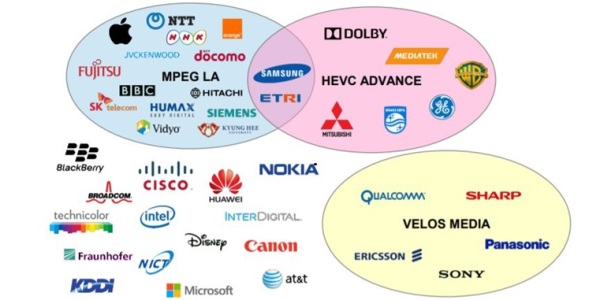[10:03 Thu,1.February 2018 by Thomas Richter] |
Leonardo Chiraglione, the founder of MPEG (Moving Pictures Expert Group, which is responsible for the standards for MP3, MPEG-2, MPEG-4, MPEGH-H) complains in a blog post about the state of licensing of the current video codec H. 265/HEVC and predicts a gloomy future for the further development of ever more efficient video codecs. As a reform, he proposes to offer a lower-quality, free-of-charge version of the current MPEG codec (linked to certain license terms, however) in addition to a licensed version. Furthermore, in the future development of MPEG standardization, the ownership of certain methods should be clear at all times and should be shown in the respective encoder/decoder tool instead of different profiles, with the possibility to select one or the other version (with all - possibly depending on the rights to the different compression methods - different licensing consequences).  H. 265/HEVC license clutter However, he deliberately overlooks the codec developments outside the MPEG on the part of large corporations, which can be understood as a reaction to their licensing confusion and which have an interest in a more efficient video codec. The AV1 video codec will be freely licenseable and is intended as a free competitor to H. 265/HEVC. The AV1 codec is made up of techniques and ideas from the codecs Daala (Mozilla), Thor (Cisco) and VP10 (Google) - but it will probably be available to the general public (and cast in hardware) as an alternative to H. 265/HEVC in 2019. The AV1 codec should compress up to 30% better than H. 265/HEVC, i. e. deliver a higher image quality at the same bit rate or the same image quality at a lower bit rate. According to Apple recently joined the Aomedia (Alliance for Open Media, which includes among others Google, Netflix, Intel, Microsoft, Mozilla, IBM, Amazon) - Facebook in November 2017 - so there is a lot of clout represented to enforce AV1 as an alternative - from the content side (Amazon, YouTube, Netflix) as well as from the software side (integration into the browser by Mozilla, Microsoft, Google and Apple) and the hardware side. All with a keen interest to avoid paying royalties for the H. 265/HEVC video codec. But whether the AV1 codec will be a success and be able to assert itself against H. 265/HEVC - and what this means for the future of MPEG - will only become apparent after 2019. deutsche Version dieser Seite: Videocodecs ohne Zukunft? |




